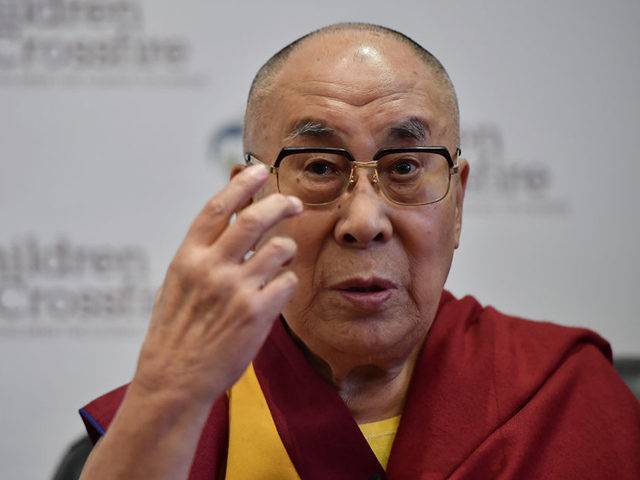Members of the Central Tibetan Administration (CTA), the government of Tibet in exile, requested that the Indian government aid in vaccinating the Dalai Lama, the top authority in Tibetan Buddhism, against the Chinese coronavirus.
Indian media reported on Wednesday that New Delhi is considering the request.
The CTA describes itself as the legitimate and democratically elected government of the Tibetan people. The Chinese government occupied Tibet in 1950 and continue to control most of the territory. The Communist Party has repressed ethnic Tibetan people for decades and lately intensified programs to control Tibetan Buddhism. Beijing has considered the Dalai Lama an enemy of the state for years.
The Dalai Lama currently lives in exile in India. Beijing has attempted to usurp his ability to name the second most powerful person in the religion, the Panchen Lama; his handpicked choice disappeared as a child in 1995. The Chinese government has since claimed a rival that it insists is the legal Panchen Lama, despite the Communist Party having no religious authority over Tibetan Buddhism.
The Press Trust of India (PTI) reported Wednesday that the local administration in Kangra district will attempt to arrange as efficiently as possible to assist the Dalai Lama in receiving a coronavirus vaccination. The CTA has also requested vaccines for Tibetan refugees in India.
“Everyone above 60 will be vaccinated. For His Holiness the Dalai Lama, we will make special provisions,” Kangra Deputy Commissioner Rakesh Prajapati told PTI. The Dalai Lama is currently 85 years old, making him vulnerable to a severe infection if he contracts the Chinese coronavirus.
The Dalai Lama is reportedly in isolation in his home and the CTA has requested that officials send a health worker to his home to vaccinate him, to prevent exposure to a crowd.
India began vaccinating its citizens in January. The country has approved two vaccines, one from the European company AstraZeneca and one made at home by Bharat Biotech. The Indian government abruptly announced that the latter, known as Covaxin, had been developed domestically, leading to many public health experts questioning how rigorously the vaccine had been tested prior to its approval. Prime Minister Narendra Modi publicly received his first dose of Covaxin this week in a bid to address skepticism regarding the product.
Indian media did not note if the government had chosen which vaccine the Dalai Lama would receive.
The move to vaccinate the leader of Tibetan Buddhism may further increase hostilities with China, which opposes India’s prolonged hosting of Dalai Lama in the country and considers him an enemy of the state. The Communist Party pressures Tibetans within its control to abandon their religion and in 2019 began a program that pays Tibetans to replace photos of the Dalai Lama with dictator Xi Jinping.
Pressure from Beijing led to reports in 2018 suggesting that Modi considered extraditing the Dalai Lama to China, a demand the Communist Party has made since his departure in 1959. Modi never made such a move, however, and instead has taken a harder line against the Communist Party, leading to military hostilities in Tibet last summer. China claims part of India, known as Arunachal Pradesh, as Chinese “South Tibet.”
A study released in September found that Beijing has begun to imprison tens of thousands of ethnic Tibetans in internment camps, similar to the Communist Party’s concentration camps for Uyghurs and other ethnic minority Muslims in Xinjiang. Tibetans have also complained of the eradication of their native language in schools — replaced with the foreign Mandarin language — and the banning of children from participating in religion in any way.
Indian media outlets have noted that Buddhist monasteries have been particularly vulnerable to coronavirus, given the close quarters in which monks live. One monastery, the Gyuto Tantric Monastery near Dharamshala, where the CTA is headquartered, documented 160 cases of coronavirus as of March 2021, according to Outlook India.
“The monastery was closed ever since the outbreak of the pandemic, the monks — numbering 330 were inside the place busy with their studies and meditations. I wonder how the infection reached them leaving half of them infected,” a local official identified as Deputy Commissioner Kangra Rakesh Prajapati said, adding that the outbreak appeared to be confined to the one monastery and that the monks had been isolated from the outside world.

COMMENTS
Please let us know if you're having issues with commenting.